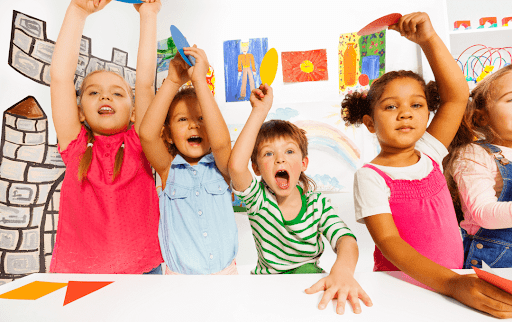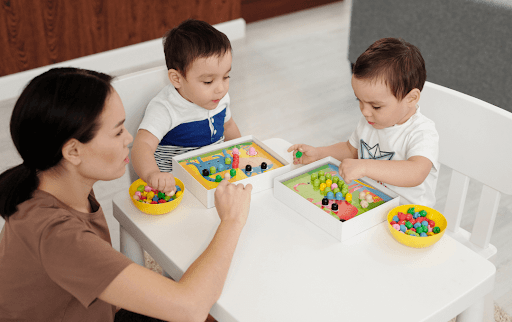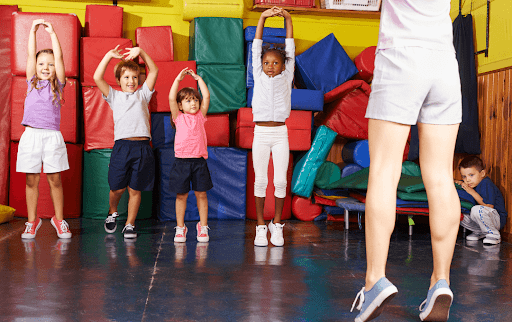Active Learning and the EYFS
Active learning is an essential aspect of the Early Years Foundation Stage (EYFS) curriculum. It refers to a teaching and learning approach that encourages children to be actively engaged in their own learning experiences. Active learning is a child-centered approach that enables children to develop a range of skills, including social, emotional, and cognitive skills.

What is Active Learning in Early Years?
 Active learning in the early years is a child-centred approach to teaching that prioritises the child’s active involvement in the learning process. Unlike traditional methods of teaching, where children may be expected to sit still and listen passively, active learning encourages children to engage with their learning environment in a hands-on and exploratory way.
Active learning in the early years is a child-centred approach to teaching that prioritises the child’s active involvement in the learning process. Unlike traditional methods of teaching, where children may be expected to sit still and listen passively, active learning encourages children to engage with their learning environment in a hands-on and exploratory way.
Children are encouraged to explore, investigate and discover new things for themselves, using their innate curiosity to drive their learning.
This approach is particularly suited to the early years, where children are naturally inclined to be active and curious learners. By actively engaging in their own learning experiences, children can develop a range of skills, from problem-solving and critical thinking to creativity and collaboration. Active learning is not only an effective way of imparting knowledge, but it also helps children to develop a love of learning that can last a lifetime.
Through active learning, children can take ownership of their learning journey, and develop confidence and independence as they learn to explore the world around them. The approach also helps children to learn how to learn, teaching them valuable skills that they can apply throughout their lives.
By taking an active role in their own learning experiences, children are empowered to pursue their interests and passions, building a strong foundation for future success.
Encouraging Active Learning in Early Years?
 Active learning in the early years is a versatile approach that can take many different forms. Play is a central component of active learning, as it provides children with opportunities to explore and experiment with the world around them.
Active learning in the early years is a versatile approach that can take many different forms. Play is a central component of active learning, as it provides children with opportunities to explore and experiment with the world around them.
Play-based learning activities, such as role-play, construction, and creative play, offer children opportunities to develop their social, emotional, and cognitive skills in a fun and engaging way.
Structured activities, such as teacher-led activities and group work, can also be designed to facilitate active learning. These activities should be interactive and stimulating, encouraging children to participate actively in the learning process.
Hands-on experiments, group discussions, and problem-solving tasks are all excellent examples of activities that can be used to promote active learning in the early years.
In addition to play and structured activities, active learning can also take place outdoors. The natural environment offers children countless opportunities to explore and learn about the world around them. Outdoor activities, such as nature walks, gardening, and wildlife spotting, can be used to promote active learning and foster a love of nature in young children.
Benefits of Active Learning in Early Years
 Active learning in the early years can bring about numerous benefits for children. By engaging in active learning activities, children can develop their creativity, problem-solving skills, and critical thinking abilities.
Active learning in the early years can bring about numerous benefits for children. By engaging in active learning activities, children can develop their creativity, problem-solving skills, and critical thinking abilities.
Through play-based learning and other interactive activities, children are encouraged to use their imagination and explore different ways of approaching tasks, leading to a greater level of creativity.
Active learning can also have a positive impact on children’s communication skills and their ability to form positive relationships with others. Through activities such as role-play and group work, children are encouraged to work collaboratively and communicate effectively with their peers. This can help to build their confidence and social skills, which are crucial for their development in later life.
Physical development is also a significant benefit of active learning in the early years. Many active learning activities involve movement and coordination, helping children to develop their gross motor skills and build strength and flexibility. This can also contribute to their overall health and well-being.
Active learning in the early years can also help children to develop a love of learning. By taking an active role in their own learning experiences, children can build their confidence and self-esteem, learning to take risks and explore new ideas.
This can help them to become more engaged with their learning, fostering a lifelong love of learning that can have a positive impact on their future academic and personal achievements.
Conclusion
Active Learning is a critical aspect of the Early Years Foundation Stage (EYFS) curriculum. It is an approach to teaching that encourages children to take an active role in their own learning experiences. Active learning can take many forms, including play-based learning, teacher-led activities, and group work.
The benefits of active learning in the early years are numerous, and include the development of creativity, problem-solving skills, communication skills, and positive relationships with others. Active learning in the early years can also promote physical development and help children to develop a love of learning.
FREQUENTLY ASKED QUESTIONS
Q: How is active learning implemented in the EYFS?
A: Active learning is a central part of the Early Years Foundation Stage (EYFS) curriculum. It is implemented through a range of play-based and interactive activities that allow children to engage with their learning environment in a hands-on and exploratory way. These activities are designed to be age-appropriate and developmentally appropriate, providing children with opportunities to develop their social, emotional and cognitive skills.
Q: What are the benefits of active learning in the EYFS?
A: Active learning in the EYFS can have numerous benefits for children. It can help to develop their creativity, problem-solving skills and critical thinking abilities. It can also improve their communication skills and help them to form positive relationships with others. Active learning can also promote physical development, as children engage in activities that promote movement and coordination. Additionally, active learning can help children to develop a love of learning, building their confidence and self-esteem.
Q: What types of activities are included in active learning in the EYFS?
A: Active learning in the EYFS can take many different forms, including play-based learning activities such as role-play, construction and creative play. It can also involve more structured activities, such as teacher-led activities and group work, as well as outdoor activities that promote exploration and learning in the natural environment.
Q: How can parents support active learning in the EYFS?
A: Parents can support active learning in the EYFS by providing opportunities for their children to explore and experiment in a safe and supportive environment. This could involve providing toys and materials that encourage creativity and problem-solving, or taking children on nature walks and outdoor adventures that promote physical development and exploration. Additionally, parents can engage in play-based learning activities with their children, such as reading stories, playing games and doing crafts together.



